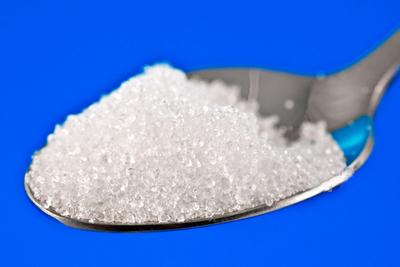Sweeteners
(but no more than 3 tsps. /day)
 Xylitol is a low-glycemic
sweetener - having
33% fewer calories than table sugar.
1 tsp. of xylitol has 10
calories
(compare to sugar's 15g),
4g carbohydrate and 4 g sugar alcohols
(sugar alcohols don't have much
impact on blood sugar levels)
Xylitol is a low-glycemic
sweetener - having
33% fewer calories than table sugar.
1 tsp. of xylitol has 10
calories
(compare to sugar's 15g),
4g carbohydrate and 4 g sugar alcohols
(sugar alcohols don't have much
impact on blood sugar levels)
Looks and tastes a lot like sugar - adds bulk to baked goods like sugar, and can be used measure for measure as a sugar substitute in recipes
Occurs naturally in fibers of some fruits and vegetables E.g. raspberries, strawberries, yellow plums, lettuce, cauliflower and corn. However, commercial xylitol is usually extracted from birch tree bark.
- Ensure xylitol is made from a non-GMO source -such as birch or beets. Avoid xylitol derived from cheap genetically modified corn.
Contains only trace amounts of vitamins and minerals -but aids body's absorption of calcium and B vitamins.
Low glycemic sweetener helpful for diabetics. Also a low carb sweetener for anyone
Deters Candida overgrowth. Does not provide sugar for the welfare of Candida and other yeast. A 2005 study found that xylitol significantly reduced Candida's effect on oral tissue. (Published in Microbial Ecology in Health and Disease, 2005)
- HOWEVER, Xylitol, like other sugar alcohols passes unmetabolized through the stomach to arrive intact in the intestines. There the xylitol is partially metabolized by drawing water into the bowel. However, the non-metabolized portion ferments and can create an environment promoting bacterial growth, exacerbate Candida yeast problems, which results in gas and possible cramping / diarrhea.
Xylitol is teeth-friendly - actively beneficial for dental health when taking at least 6g /day
Remacle, Claude; Reusens, Brigitte, ed. (2004).Functional foods, ageing and degenerative disease. Cambridge, England: Woodhead Publishing. p.202.ISBN978-1-85573-725-9.
• Has antibacterial qualities
Birkhed D., Cariologic aspects of xylitol and its use in chewing gum: a review. Acta Odontol Scand 1994; 52:116-127.
Edgar WM., Sugar substitutes, chewing gum and dental caries -a review. Br Dent J 1998; 184:29-3
• Helpful in remineralization of teeth.
Steinberg, LM; Odusola, F; Mandel, ID (Sep-Oct 1992)."Remineralizing potential, antiplaque and antigingivitis effects of xylitol and sorbitol sweetened chewing gum.".Clinical preventive dentistry14(5): 31-4.PMID1291185. Retrieved 13 November 2013.
• Effective in inducing remineralization of deeper layers of demineralized enamel
http://www.ncbi.nlm.nih.gov/pubmed/14700079
http://www.drellie.com/pdfs/The-Remineralization-effects-of-XYLITOL.pdf
Xylitol has no known toxicity or carcinogenicity in humans - and is considered safe by the U.S. FDA
Xylitol can be toxic to dogs - dogs consuming >100mg xylitol / kilogram body weight can present with low blood sugar (hypoglycemia), which can be life threatening.